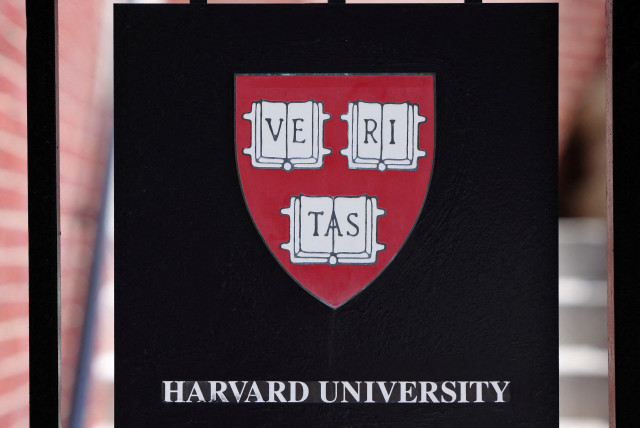Times have changed for Harvard Hillel - opinion

Harvard Hillel consistently enables students to grapple with Israel’s challenges as an imperative of Jewish life and maturation.
When The Harvard Crimson reached out to let me know that my forerunner in the directorship of Harvard Hillel, Bernie Steinberg (no relation), had submitted an unsolicited op-ed suggesting that charges of antisemitism were being used on campus to silence criticism of Israel, and asking if I wished to offer an opposing op-ed, I declined. Those no longer on campus should not sound off in the student newspaper.
Now that I have seen Bernie’s op-ed, however, it is important for me to go on record with a perspective very different from his, based on my own time directing Harvard Hillel and drawing on my present role as director of Anti-Defamation League’s (ADL) New England office – for three reasons.
First, Bernie has been away from Harvard for some 14 years, and his suppositions are, frankly, out of touch with what Jewish students and the Jewish community are currently facing. In the decade since Bernie was on campus, antisemitic incidents across the country have increased fivefold; and, according to recent ADL research, 73% of Jewish college students have experienced or witnessed antisemitism since the beginning of the present 2023-2024 school year.
Second, what actually confronts students who are connected with and who care about Israel on campus today is far less about “criticism” of Israel. “Criticism,” especially in an academic context, suggests arguments that are informed and reasoned. It is far more about a fantasy that Israel can be ended, and a corresponding demonization that has become axiomatic.
And third – and most of all – what Bernie alleges about a silencing of critical voices on Israel is vastly out of keeping with the resolute wrestling with Israel and its issues that Israeli students at Harvard and students in the Harvard Hillel community in fact practice and represent.
Far from quashing critical voices on Israel, Harvard Hillel, in my experience, consistently enables students to grapple with Israel’s challenges as an imperative of Jewish life and maturation. In my time as director, Harvard Hillel welcomed opposition politicians critical of Israeli governments and policies and featured critical thinkers, writers, and speakers representing so many segments of Israel’s complex society, including many non-Jewish voices.
Not satisfied with an off-the-shelf Birthright trip itinerary, by adding an “and Beyond”-program, in my time Harvard Hillel tripled participation in the trip by exploring Israeli society and geopolitics, including visits with Palestinian leaders and Jewish settlers across the Green Line, with the ultra-Orthodox community, and with Women of the Wall. Even during the pandemic, Harvard Hillel’s online virtual Israel trip was co-led by Israeli and Palestinian tour guides.
Anti-Israel groups at Harvard increasingly practice 'non-normalization'
BY CONTRAST, the anti-Israel student groups of Harvard increasingly practice what they call “non-normalization,” which is an adamant refusal to have any conversation about Israel unless it is premised on the conviction that Israel must cease to be. Direction from beyond Harvard’s gates, to which anti-Israel activism on campus now hews unfailingly, has made impossible the kinds of conversation across differences we used to be able to foster and to practice. I respect Bernie’s experience very much for what it was when it was, but that sea change is simply not part of his experience.
Harvard Hillel does draw a firm line excluding speakers and programs whose purpose is to urge disconnection from Israel.
But that is not about precluding criticism; it is about recognizing that, with almost half of all Jews alive in the world today residing in Israel, connection with Israel is a fact of Jewish life and kinship, and wrestling with Israel’s issues is a corresponding Jewish imperative. Enabling students to grapple with Israel’s issues in ways befitting the capabilities of Harvard students forges understanding and connection that endure well beyond the college years. The campus opposition to Israel traffics mostly in simplistic slogans and in the zero-sum-game notion that Israel must be destroyed or “decolonized” in order for Palestinians to have dignity.
Bernie accuses Jewish forces at Harvard today of a “McCarthyist tactic of manufacturing an antisemitism scare,” and of “bullying.” But he was not, as I still was, on the speed-dial of the Israeli student who lost three close people to the Hamas terrorism of October 7 and then awoke to hear a “tutor” (Harvard-speak for a resident adviser) leading a chant of “Intifada, intifada, globalize the intifada!” through a megaphone. ADL’s 10 recommendations for college and university leadership to tackle antisemitism respond directly to the very real hostility students are facing – and in view of their experiences it is absurd to contend, as Bernie does, that anti-Israel voices are being silenced.
As Harvard’s president Claudine Gay steps down, MIT President Sally Kornbluth has issued a statement saying, “It’s clear that we need a better sense of how to navigate the principles of freedom of expression, which we must protect, and the need to guard against harassment, bullying, intimidation, and discrimination – policy violations that must be subject to discipline.”
That is hardly in response to anything Jewish students have done to opponents of Israel on campus, as Bernie suggests, but the opposite.
In his op-ed, Bernie invokes the Oslo Accords, the Second Intifada, 9/11, and Israel’s Second Lebanon War. I can relate. Those milestones and experiences have shaped my Jewish life and experience, too.
But so have the past 12 years on campus, caring for Jewish students and community in a climate very different from that of Bernie’s time at Harvard.
The writer serves as the New England regional director of the Anti-Defamation League.
Jerusalem Post Store
`; document.getElementById("linkPremium").innerHTML = cont; var divWithLink = document.getElementById("premium-link"); if (divWithLink !== null && divWithLink !== 'undefined') { divWithLink.style.border = "solid 1px #cb0f3e"; divWithLink.style.textAlign = "center"; divWithLink.style.marginBottom = "15px"; divWithLink.style.marginTop = "15px"; divWithLink.style.width = "100%"; divWithLink.style.backgroundColor = "#122952"; divWithLink.style.color = "#ffffff"; divWithLink.style.lineHeight = "1.5"; } } (function (v, i) { });

